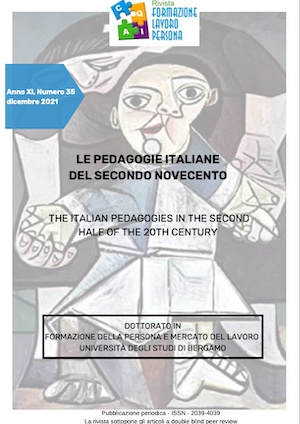Enactive pedagogies based on the concepts of embodied cognition and learning by doing
Abstract
This paper presents the pedagogies of enactive matrix based on the concepts of embodied cognition and learning by doing that originate from the approach proposed by the Chilean biologists / epistemologists Maturana and Varela (1980). The concept of enactive approach and the related enaction construct have been further explored and expanded by Varela, Thompson and Rosch in the tome The Embodied Mind published in 1991, where the authors aims to identify a new criterion for scientific investigation in cognitive sciences of relevance for a possible pedagogical-didactic innovation. After outlining the theoretical supports of the enactive paradigm and embodied cognition, collecting contributions on the forerunners of the relative school of thought and their successors at the international level, the applications of this model and the pedagogical research lines developed at the national level were examined. Finally, mention was made of how this pedagogical model is finding applications in many educational agencies in our country.









